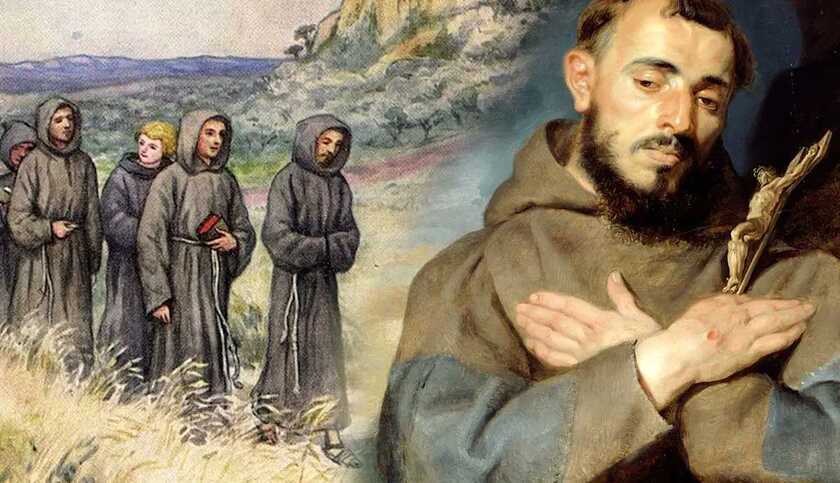Ok Peeps, I know, I know...
But stay with me, okay?
What follows is the the 29th chapter of The Little Flowers of St. Francis, a classic collection of popular stories about the life of St. Francis of Assisi and his early companions.
In it, Br Rufino is suffering deeply with the fear that he is destined to be condemned to Hell. When Francis finds out about this he tells Br Rufino, the next time Satan tempts him in that way he should respond, "Open your mouth Satan, because now I am going to shit in it!"
The translation below uses the word dung, but the original Itallian is "cacare" which is most certainly shit. Some versions today don't even use the word dung so that it just says "open your mouth," which is kind of lame.
Ok ... I've boldened the line below in case you're in a hurry.
What's funny about this is I don't even know what he means ... like, what could "open your mouth so I will shit in it" possibly mean analogously ... If you know, let me know below.
FRIAR RUFFINO, one of the most noble citizens of Assisi and a companion of St. Francis, a man of great sanctity, was once most violently assailed and tempted in his soul concerning predestination; whereby he became exceeding sad and melancholy, in that the demon put it into his heart that he was damned and was not among those predestined to eternal life, and that he was losing that which he did in the Order.
And this temptation continuing for many many days, albeit he revealed it not to St. Francis for very shame, he nevertheless abandoned not the observance of the customary prayers and fasts; wherefore the enemy began to add grief to grief, over and above the battle within, assailing him also from without by false apparitions.
Wherefore, on a time, he appeared to him in the form of Christ Crucified, and said unto him: "O Friar Ruffino, wherefore dost thou afflict thyself in penance and in prayer, when thou art not among those predestined to eternal life? And, believe me, I know whom I have elected and predestined; and believe thou not the son of Peter Bernardoni, if he tell thee the contrary, and also ask him not touching this matter, because neither he nor others know it, save I alone who am the Son of God; and, therefore, believe me for certain that thou art of the number of the damned; and the son of Peter Bernardoni, thy father, and his father, also are damned, and whosoever follows him is deceived." And, when these words had been spoken, [the mind of] Friar Ruffino began to be so darkened by the Prince of Darkness, that he lost all the faith and love which he had had for St. Francis, and cared not to tell him anything thereof.
But that which Friar Ruffino said not to the holy father the Holy Spirit revealed to him; wherefore St. Francis, seeing in spirit the exceeding peril of the said friar, sent Friar Masseo for him; to whom Friar Ruffino replied upbraidingly: "What have I to do with Friar Francis?" Then Friar Masseo, fulfilled with Divine wisdom and knowing the wiles of the devil, said: "O Friar Ruffino, knowest thou not that Friar Francis is as an angel of God, who hath illumined so many souls in the world, and from whom we have received the grace of God? Wherefore I will that by all means thou come with me to him; because I see clearly that thou art deceived by the devil."
And when he had thus spoken, Friar Ruffino arose and went to St. Francis. And seeing him coming afar off, St. Francis began to shout: "O Friar Ruffino, thou poor wretch, whom hast thou believed?" And when Friar Ruffino had come unto him, he told him in order all the temptation wherewith he had been tempted by the demon, both within and without; and he showed him clearly that he who had appeared unto him was the devil and not Christ, and that on nowise ought he to consent to his suggestions; "but when the devil shall say unto thee again: 'Thou art damned,' do thou answer him thus: 'Open thy mouth, for now I would void my dung therein'; and this shall be a sign unto thee that he is the devil and not Christ, that when thou shalt have thus answered him he will immediately flee away.
Also by this token thou oughtest to have known that he was the devil, because he hardened thy heart to every good thing, the which is his proper office; but Christ the blessed never hardens the heart of the faithful man, but rather softens it, according as He saith by the mouth of the prophet: I will take away from you the stony heart and will give you a heart of flesh."
Then Friar Ruffino, perceiving that St. Francis told him in order all the fashion of his temptation, was moved to repentance by his words and began to weep sore and to adore St. Francis as a saint, and to humbly acknowledge his fault in having concealed his temptation. Thus was he filled with consolation and comfort by the admonishments of the holy father, and altogether changed for the better.
Thereafter, at the last, St. Francis said unto him: "Go, son, and confess thyself and forget not thy accustomed diligence in prayer; and know of a surety that this temptation will be to thee a great benefit and consolation, as in a little while thou shalt prove."
Then Friar Ruffino returned to his cell in the wood, and lo! while he continued in prayer, with many tears, the enemy appeared to him in the person of Christ, according to all outward seeming, and said unto him: "O Friar Ruffino, have I not told thee not to believe the son of Peter Bernardoni and not to weary thyself in tears and prayers, because thou art damned? What doth it profit thee to afflict thyself while thou art alive, when afterward, when thou shalt die thou shalt be damned?"
And forthwith Friar Ruffino replied to the demon: "Open thy mouth, for now would I void my dung therein"; and immediately, the devil departed, full of fierce anger, with such tempest and commotion of the rocks of Mount Subassio, which was there beside, that the shattering of the rocks which fell down lasted for a long time; and so mightily did they crash together that they shot forth horrible gleams of fire through all the valley; and, for the terrible din which they made, St. Francis and his companions came forth from the Place in great amazement, to see what new thing this might be; and even unto this day that exceeding great ruin of rocks may be seen there.
Then Friar Ruffino perceived clearly that it was the devil who had deceived him; and he returned to St. Francis and anew flung himself upon the ground and acknowledged his fault, and St. Francis once more comforted him with sweet words and sent him back to his cell wholly consoled.
There, while he continued in prayer with exceeding great devotion, the blessed Christ appeared to him, and enkindled all his soul with Divine love, and said: "Well hast thou done, son, that thou didst believe Friar Francis, in that he who afflicted thee was the demon; but I am Christ, thy master; and to make thee very sure thereof I give thee this sign: As long as thou shalt live, thou shalt never feel any sadness or melancholy".
And, when He had thus spoken, Christ departed leaving him so full of joy and sweetness of spirit and exaltation of soul, that day and night he was absorbed and rapt in God. And, from thenceforward, he was so confirmed in grace and in assurance of salvation that he became altogether changed into another man; and he would have continued day and night in prayer and in contemplation of Divine things, if the others would have let him alone. Wherefore St. Francis used to say of him, that Friar Ruffino was in this life canonised by Christ, and that, except in his presence, he would not hesitate to call him St. Ruffino, albeit he was yet alive on earth.*
--




















